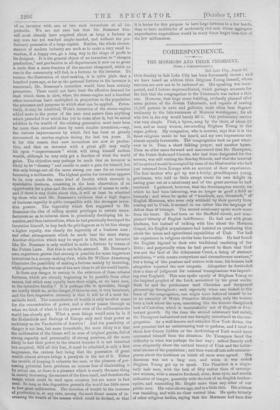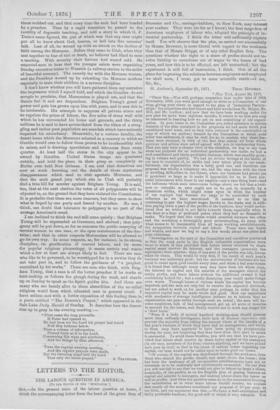CORRESPONDENCE.
THE MORMONS AND TEIEIR PRESIDENT. [Faesi a CORRESPONDENT.] Salt Lake City, August 29,
Oun Sunday in Salt Lake City has been fortunately chosen ; an we have heard an address from Brigham Young himself, whose- sermons are now not to be reckoned on. His speaking was unex- pected, and I believe unpremeditated, which perhaps accounts for the fact that the congregation in the Tabernacle was rather a thin. one. However, that huge stone building, evidently planned after some picture of the Jewish Tabernacle, and capable of seating. 11,000 persons in nave and galleries, must often bear flagrant testimony to the luke warmness of Mormon worshippers ; for all who live in the city would barely fill it. Onr preliminary service was very simple. First, a hymn, sung by the choir, of about 2./ men, and as many women, surrounding Brigham Young in the organ gallery. My companion, who is musical, says that it is the- finest religious music he has heard, and my own impressions are almost equally favourable. Tlie congregation took no part what- ever in it. Then a short bidding prayer, and another hymn.
Then an elder came forward and announced that Dr. Thompson, of the Dutch Reformed Church, who had been designated for the. sermon, was still visiting the Sunday Schools, and that the interval till he arrived would be occupied by some of the Missionaries who hal just returned from Europe with an account of their experiences.. The first brother who got up was a frothy, grandiloquent young. gentleman, who told us little except about his own delight in. having gone out as a missionary aud of the great services he had rendered. I gathered, however, that the Southampton circuit, on- which he had been labouring, was no longer as good a field as formerly ; and when he spoke of "hundreds, aye, thousands," of" English Mormons, who were only withheld by their poverty from, coming out to Utah, it seemed to me rather like the language of defeat than of triumph. The second missionary spoke much more- from the heart. He had been on the Sheffield circuit, and com- plained bitterly of English indifference, He had met with great. kindness, but instead of talking with him about the Mormon. Gospel, his English acquaintance had insisted on questioning him, about the mines and agricultural capabilities of Utah. Nor had. his experience in religious circles been favourable. He had found. the English bigoted to their own traditional rendering of the Bible ; and perpetually when he had proved to them that God was not the God of the Athanasian Creed, a being of abstract attributes, " with centre everywhere and circumference nowhere,"" but a being of like passions and nature with man, his hearers had altogether rejected the new exegesis. Altogether he foreboded, that a time of judgment for national transgressions was impend- ing over England. This man spoke openly of Brigham Young as. the inspired prophet of the Lord, accredited by his great works. Both he and his predecessor used Christian and Seriptural phraseology throughout ; and, especially when one looked at the faces of the congregation, one might have believed oneself to be in an assembly of Welsh Primitive Methodists, only the women, have a look about the eyes, something like the demure disciplined. look of Catholics, which is unmistakably not of English or Pro- testant growth. By the time the second missionary had ended,. Dr. Thompson had arrived and was formally introduced to the con- gregation. As a well-known and orthodox New York divine, the- new preacher had an embarrassing task to perform, and I tried to. think how Canon Liddon or the Archbishop of York would haves extricated himself from the situation. Dr. Thompson faced the difficulty in what was perhaps the best way ; talked fluently anct even eloquently about the natural beauty of Utah and the indus- trial labours of the population ; and thou went off into safe common- places about the doctrines on which all sects were agreed. His. discourse was not a long one, and when it was ended. Brigham. Young got up to speak. The President is a singu- larly halo man, with the look of fifty: rather than of seventy- two winters, with a massive forehead, clear, keen eyes, and mouth, indicative of temper, generally with the look of an English banker- squire, and resembling Mr. Bright more than any other of our- public men. His voice shows age, and is a little thin. His address. was rambling, and with no clear central idea. He spoke bitterly of other religious bodies, saying that the Mormons had been five
times mobbed out, and that every time the mob had been headed by a preacher. Then by a rapid transition ho passed to the inutility of dogmatic teaching, and told a story in which G. F. Train's name figured, the gist of which was that any man might put all he knew about God, heaven, or hell into five minutes' talk. Last of all, he wound up with an attack on the decline of faith among the Mormons. Before they came to Utah, when they met together in fear of riot or death, no believer had liked to miss a meeting. With security their fervour had waxed cold. He -expected soon to hear that the younger saints were organizing Sunday excursion trains to Wasatch (a railway station in the midst of beautiful scenery). The remedy lay with the Mormon women, and the President wound up by exhorting the Mormon mothers -especially to train their children in a severer discipline.
I don't know whether you will have gathered from my narrative the impression which I myself hold, and which the Gentiles do not scruple to proclaim, that Mormouism is played out, and that the Saints feel it and are despondent. Brigham Young's greed of power and gain has grown upon him with years, and is now felt to be intolerable. Ills attempts to suppress all private stores and 'to regulate the prices of labour, the five miles of stone wall with which he has surrounded his house and grounds, and the thirty 'millions he is said to have accumulated from the tithes of a strug- gling and rather poor population are scandals which have seriously impaired his ascendancy. Meanwhile, by a curious fatality, the desert home which the Mormons selected as a country to which no .Gentile would care to follow them proves to be inexhaustibly rich in mines, and is drawing speculators and labourers from every quarter. At least half the stores in the city appear to be owned by Gentiles. United States troops are quartered -outside, and hold the place in their grasp as completely as Butler ever held New Orleans. I am told that detectives are now at work ferreting out the details of those mysterious ,disappearances which used to visit apostate Mormons, and that the next grand jury which sits in Utah will probably find a true bill for murder against Brigham Young. It is said, too, that at the next election the votes of all polygamists will be 'objected to, on the ground that they have violated the Constitution. It is probable that these are mere rumours, but they serve to show what is hoped by one party and feared by another. No one, I think, can doubt that tolerance to polygamy is no part of the 'average American's creed.
I am inclined to think the end will come quietly ; that Brigham Young will be superseded as Governor, and shelved ; that poly- gamy will be put down, so far as concerns the public marrying of meveral women to one man, or the open maintenance of the doc- trine; and that in other respects Mormonism will be allowed to .go its own way. In some respects, as, for instance, in its strong discipline, its glorification of manual labour, and its scorn for popular religious phraseology, it meets certain real wants which a few at least are always likely to feel. There are men who like to be governed, to be worshipped for in a service they do not take part in, and to follow the guidance of "a prophet, .accredited by his works." There are men who think, with Brig- ham Young, that a man is all the better preacher if he works at tent-making or follows the plough during the week, and stands 'up on Sunday to speak as the Spirit guides him. And there are many who are keenly alive to those absurdities of the so-called religious world from which educated men in general recoil. I have seldom met with a better exposition of this foaling than in -a poem entitled "The Deacon's Prayer," which appeared in the Salt Lake Daily Herald of Sunday. It describes how the deacon Arose up to pray in the evening meeting :— "First came the long preamble.
If Peter had opened so, He had been ore the Lord his prayer had hoard Full fifty fathoms below.
Then a volume of information, Poured forth as if to the Lord, Concerning His ways and attributes, And the thinge by Him abhorred.
'Twits the regular evening meeting, And the regular prayers were made, But the listening angel told the Lord
That only the silent prayed." A TRAVELLER.



































 Previous page
Previous page